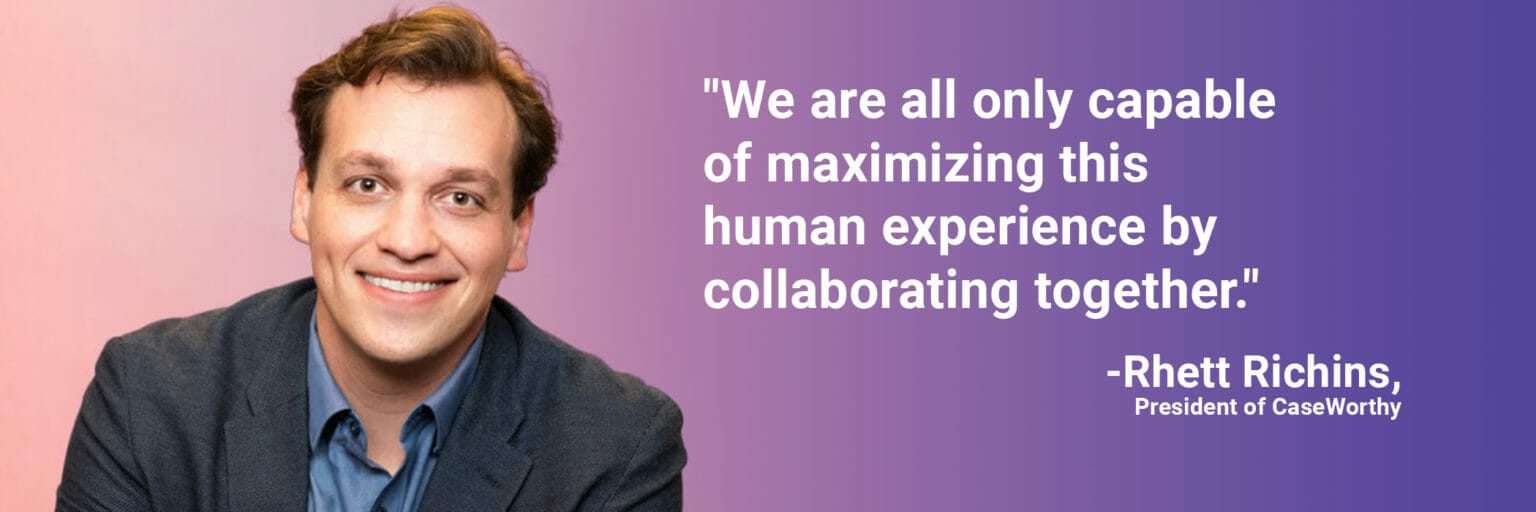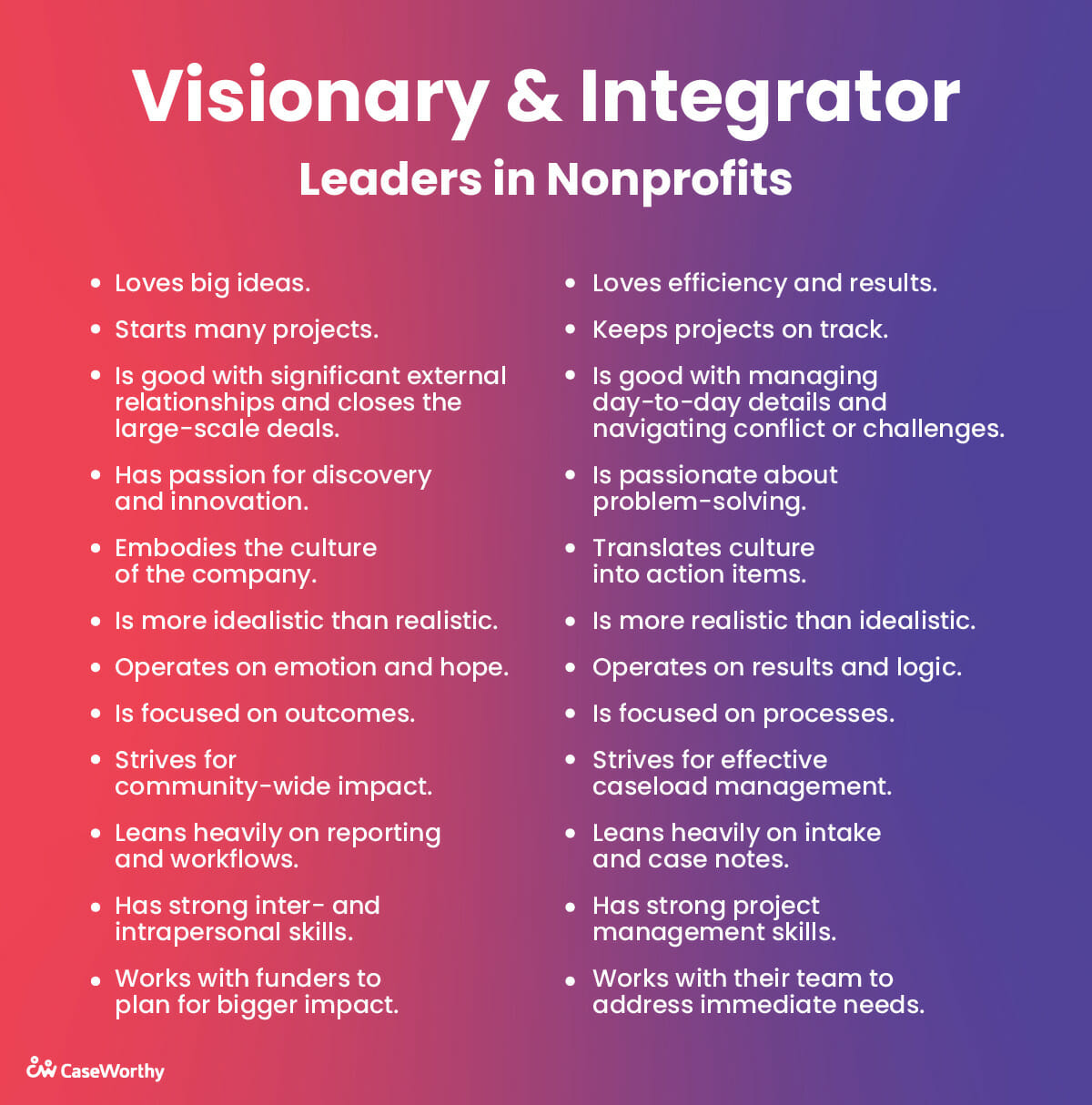
What is a Visionary?
At CaseWorthy, we’ve had the privilege of working with incredible organizations spearheaded by compassionate, inspiring leaders. Nonprofits are able to most effectively operate when action follows vision and aligns a team towards a core mission. In our space, that mission is simple—we operate with a genuine desire to help others, just like our nonprofit partners. Nonprofits succeed when their clients succeed, and it’s critical for that mission to remain the heartbeat behind what an organization does. Here are some key traits we’ve admired in Visionary nonprofit leaders we’ve worked with.
A Visionary Leader:
- Loves big ideas.
- Starts many projects.
- Is good with significant external relationships and
closes the large-scale deals. - Has passion for discAovery and innovation.
- Embodies the culture of the company.
- Is more idealistic than realistic.
- Operates on emotion and hope.
- Is focused on outcomes.
- Strives for community-wide impact.
- Leans heavily on reporting and workflows.
- Has strong inter- and intrapersonal skills.
- Works with funders to plan for bigger impact.
Typically, a Visionary will look at the big picture. Rather than being overtly details-oriented, a Visionary is more concerned with the why a nonprofit exists, rather than how the nonprofit operates. Visionaries are empathetic, passionate, and charismatic, with a unique ability to generate ideas and inspire others to work together. However, that big-picture thinking may sometimes need honing. That’s where an Integrator can enter the picture and work in tandem with a Visionary to effectively lead an organization.
What is an Integrator?
An Integrator is also a passionate individual, but is more focused on accomplishing tasks than generating ideas. Integrators often support their Visionary peers, and head up teams by providing support in the form of structure and concrete milestones. Typically, an Integrator monitors the progress of benchmarks, and is accountable for profit and loss. Here are some key traits we’ve admired in Integrator nonprofit leaders we’ve worked with.
An Integrator Leader:
- Loves efficiency and results.
- Keeps projects on track.
- Is good with managing day-to-day details and
navigating conflict or challenges. - Is passionate about problem-solving.
- Translates culture into action items.
- Is more realistic than idealistic.
- Operates on results and logic.
- Is focused on processes.
- Strives for effective caseload management.
- Leans heavily on intake and case notes.
- Has strong project management skills.
- Works with their team to address immediate needs.
Integrators may take on a more behind-the-scenes role than Visionaries. An Integrator is more likely to focus on smaller, bite-sized goals, leaning on the overall mission that Visionaries lay out. When Integrators get too focused on numbers or data points, a Visionary partner can jump in to encourage and point back to the purpose behind a set of tasks.
How a Visionary and an Integrator Can Collaborate for the Greater Good
We’ve found that the most successful nonprofits stay true to their values with leaders at the top who continue to find new ways to motivate team members to drive their mission forward. Nonprofits like to talk about “puzzle pieces.” The Visionary puts those puzzle pieces together to create a full picture in which case managers are inspired to help meet clients’ needs. The Integrator tends to keep the puzzle pieces together once they’re assembled by doing more granular administrative work, providing streamlined processes, and supporting case managers.
Regardless of whether a nonprofit leader leans more toward being a Visionary or an Integrator, they must ultimately desire the success of their clients. When a Visionary and Integrator work together, they can balance passion and execution to create meaningful differences. Neither a Visionary nor an Integrator is a better leader than the other—rather, it’s the collaboration between these two types of minds that often make up the strongest leadership teams. We’ve worked with leaders and teams like this, and this combination often leads to better outcomes for the communities they serve.

What about the Rest of the Team?
Many leaders will often say that they’d be nothing without their team supporting them, and this is especially true in the nonprofit sector. Case managers and data administrators perform tasks everyday that support clients in getting the assistance they require. In order for the whole team to work well together, they should all have a common goal and ways to achieve that goal. The goal, helping others, is usually rooted in the organizations’ mission, and the values of the nonprofit. This should be evident throughout, and starts from the top, oftentimes by a Visionary leader. Case managers and data administrators should be supported with processes and action items to achieve the greater goal, typically fleshed out by an Integrator.
![]() In order for case managers to stay motivated, they need to believe in their daily mission. Case managers are advocates for their clients and work hard to coordinate services. Without passion, case managers may experience burnout, or lose sight of why they do the work they do. Without execution strategies in place, case managers may not know what steps to take to assist clients. When Visionary leaders and Integrator leaders work together, they can help create a solid foundation so case managers feel supported in their daily workloads.
In order for case managers to stay motivated, they need to believe in their daily mission. Case managers are advocates for their clients and work hard to coordinate services. Without passion, case managers may experience burnout, or lose sight of why they do the work they do. Without execution strategies in place, case managers may not know what steps to take to assist clients. When Visionary leaders and Integrator leaders work together, they can help create a solid foundation so case managers feel supported in their daily workloads.
![]() Data administrators play a crucial role in ensuring success in the nonprofit space. Client data influences every aspect of a nonprofit’s daily operations, both internally and externally. A Visionary leader may need specific reports generated with client data to demonstrate the organization’s overall impact. An Integrator leader may want to evaluate intake and case notes to better determine what services the organization should aim to provide clients, and the best ways to deliver those services. A good leadership team will provide data administrators with the tools required to best input and leverage client data to improve community outcomes.
Data administrators play a crucial role in ensuring success in the nonprofit space. Client data influences every aspect of a nonprofit’s daily operations, both internally and externally. A Visionary leader may need specific reports generated with client data to demonstrate the organization’s overall impact. An Integrator leader may want to evaluate intake and case notes to better determine what services the organization should aim to provide clients, and the best ways to deliver those services. A good leadership team will provide data administrators with the tools required to best input and leverage client data to improve community outcomes.
As visions take shape and processes form throughout the nonprofit, it’s critical for leaders to have a way to transfer information throughout their organization. Case managers and data administrators should have a framework in place that allows them to accomplish their daily tasks, better assist clients, and create broader, more significant impact in the community. That’s where CaseWorthy comes in.
CaseWorthy is a powerful case management solution that can streamline workflows and systems so your team can focus on what matters most—the people you serve.
CaseWorthy is a tool that can be implemented organization-wide so the nonprofit can continue to hire caring, compassionate workers who assist people in need. What we do is rooted in passion, and committed to delivering on the production side, from the people you meet on our team, to the tool you use. Our leaders can relate to your leaders. Our success is our clients’ success. And we’re all in this space to make the world a better place. We’re just here to provide a useful, intuitive tool that makes it easier for nonprofits to operate and do what they do best—serve others. CaseWorthy can help nonprofits see their visions laid out with a software that streamlines the way case managers work to better set clients up for successes.
